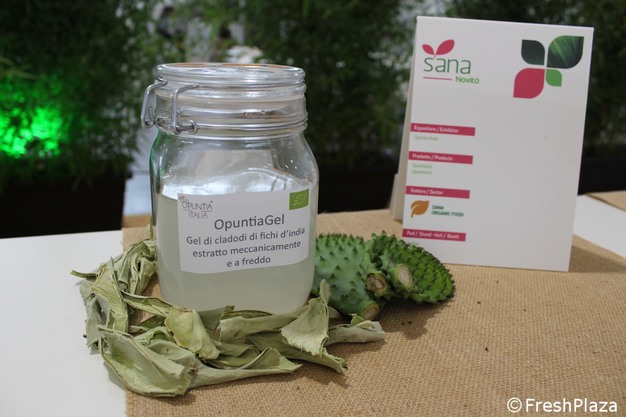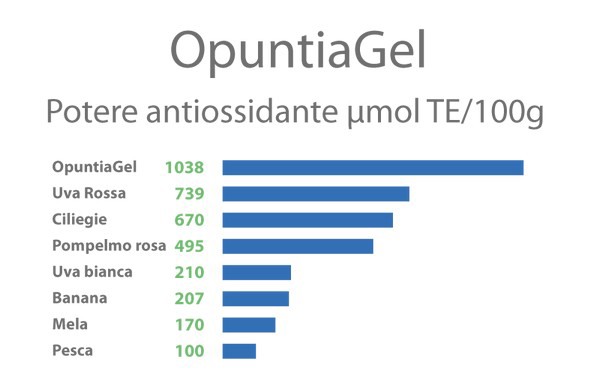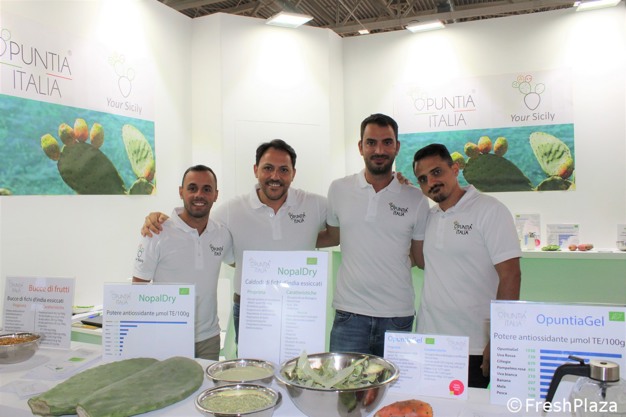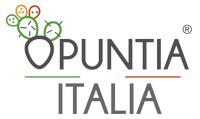The prickly pear is not only tasty but has many properties. The Sicilian company Opuntia Italia, which transforms everything but the roots of this plant, belonging to the Cactaceae family, is well aware of this. At the 34th edition of Sana, it presented the world's first opuntia gel (another name for prickly pear, ed.) as an alternative to aloe vera. The product also took part in Sana Novelties, Organic Food section.

"Our organically grown prickly pear cladodes gel is extracted mechanically and cold-pressed. This is not as simple as people think, because compared to aloe vera, the inner part of cladodes is spongy," explained Angelo Incorvaia, president and director of production and sales, Opuntia Italia. "The gel is used in pharmaceuticals, nutraceuticals, cosmetics and food. Its properties are many and it can be used as a food supplement, gastric protector, natural antioxidant, healer, after-sun, skin soother and filler, antibacterial, hair conditioner and as an ingredient base for natural dyes."

"From the results of analysis, its antioxidant power is much higher than that of famous fruits such as red grapes, cherries, and pink grapefruit," explained Incorvaia.
Located in contrada Burgio, in the industrial area of Butera (CL), Opuntia Italia's plant is divided into three production areas designed to process liquid-phase products, solid-phase products, and dried products for a total area of 25,000 square meters. A warehouse of 2,500 platform spaces ensures significant storage of processed products.
"We are less than a kilometer from the crops and immersed within the prickly pear production district of San Cono, the so-called European capital of the fruit. The facility is home to first-wash and sanitization lines for freshly harvested cladodes and prickly pears, to be subsequently processed," said Incorvaia.
 The Opuntia Italia team at Sana 2022. From left: Felice Mezzasalma (vice-president and logistics manager), Angelo Incorvaia (president and production and sales manager), Titta Platamone (biologist technician and product development and quality manageress) and Sandro Incorvaia (IT and administrative and automation manager).
The Opuntia Italia team at Sana 2022. From left: Felice Mezzasalma (vice-president and logistics manager), Angelo Incorvaia (president and production and sales manager), Titta Platamone (biologist technician and product development and quality manageress) and Sandro Incorvaia (IT and administrative and automation manager).
Prickly pear cladodes are also offered fresh. "The newly formed ones 2 to 5 months from organic farming are particularly tender, fiber-free and almost thornless. It is used mainly in Mexico as a food, has a taste reminiscent of green beans, and can be used raw or cooked in salads. The 2-3-year-old organically grown prickly pear cladodes are rich in mucilage (between 60 and 80 percent), mineral salts and fiber and are used in the cosmetic, nutraceutical and pharmaceutical industries."
"In the case of our dry products," continues Incorvaia, "the dryer plays a fundamental role since, based on its performance, production capacity, product quality and production cost are determined, which in turn determines the selling price. The peculiarity of the plant, which retains water inside it, has greatly complicated the stage of identifying the correct characteristics of the dryer. Our dryers are completely made of stainless steel, use heat generated by biomass boilers and are equipped with 4.0 technology that allows us to monitor and record all drying stages, notifying us of any anomalies during the process."
Cladodes are offered cubed 2x2 cm and dried; dried and shredded in the 0.2/0.5 cm herbal tea cut size; and dried and micronized at 300/500 mesh. Prickly pear fruit peels from organic farming are also dried and shredded in the 0.2/0.5 cm herbal tea cut format or dried and micronized at 300/500 mesh.
"We obtain a pure, seedless and always organic juice from the fruit. Pressing does not involve the peel, which is removed before pressing. This juice is used in the food industry, in the creation of fruit juices and semi-finished products for bakeries and ice cream parlors. We do not make a selection by color of the prickly pear; therefore, the juice combines yellow, white and red fruits."
Finally, the prickly pear flowers. "They are dried at low temperature and are very rich in gallic acid, polyphenols, magnesium, vitamin C and betalains. In addition to being used to fight kidney stones and colic, they exert an important antispasmodic action on the intestines and spleen and have important diuretic properties," added the president of Opuntia Italia.
"We can sell our products anywhere. Right now, we focus on Italy, but if we were to receive requests from abroad, we wouldn't set ourselves any limits," concluded Incorvaia.
For more information:
Angelo Incorvaia Opuntia Italia
Opuntia Italia
Via G. Pacini, 6
92027 Licata (AG)
+39 320 8485846
info@opuntiaitalia.com
www.opuntiaitalia.com
